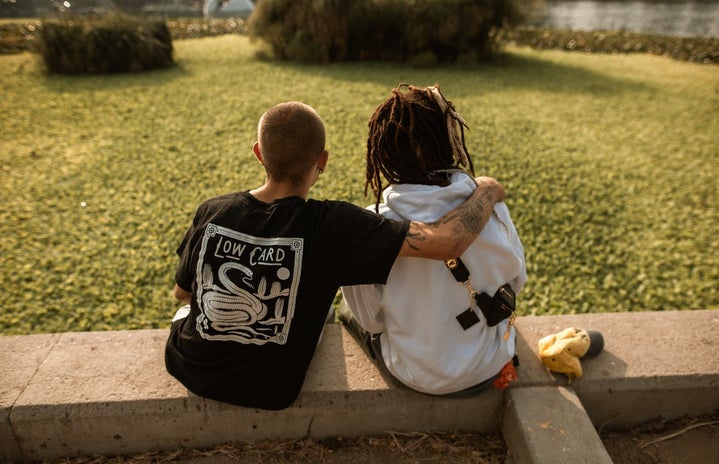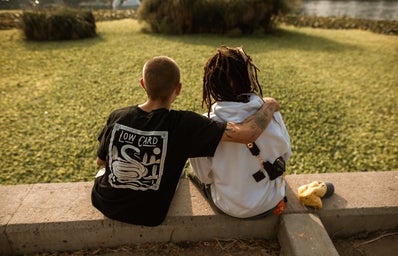Trigger Warning: This article explicitly discusses self-harm in context which includes methods of and reasons for self-harm, as well as a brief mention of suicide. Please do not continue if these concepts trigger you or make you feel uncomfortable.
I self-harmed today. Self-harm (in this article, I will refer to it as “SH”) is something that I have struggled with since I was about 13 or 14 years old, and I still continue to struggle with it today, at 19. I’m going to use this platform to discuss an issue that is insanely close to my heart. As someone who has experienced this problem for a long time, all I hope to do with this article is to bring awareness to self-harm, as well as maybe help others who are also struggling with hurting themselves. Here we go.
First off, I need to clear the air and address the elephant in the room. SH is an addiction, something that can be extremely difficult to break and that has the power to ultimately take over the lives of those affected. There are countless stigmas surrounding SH, including the idea that people do it for attention or because they are crazy. This stigma is wildly problematic for a myriad of reasons, including the fact that it causes those who struggle with SH to feel guilty and ashamed of their addiction. SH is not something that people do for attention, and it can plague every aspect of one’s daily life. Creating extra unnecessary shame and guilt for those who suffer from this addiction can be severely triggering and can lead to more NSSI (non-suicidal self-injury), or even cause them to feel worthless, which can lead to suicidal thoughts or actions. Overall, the stigma surrounding SH is hateful to those who experience mental illness, and can even become fatal if we do not reform our thinking and speak and act with compassion.
SH is more common than you may think, and it is much more complicated than the media makes it out to be. It’s not just “cutting”. A study that was done through 40+ countries found that approximately 17% of people will engage in SH at some point in their lives. That amounts to 1,304,580,000 people. Put into perspective, that number is a lot bigger than I could have ever expected. From the same article, I learned that the average age to begin engaging in SH is 13, that men underreport their experiences with SH compared to women, and that approximately half of all bisexual women experience this addiction. Additionally, 15% of college students carry this burden as well. These statistics had me sitting back in my desk chair, thinking about how 1) I am way less alone in my addiction than I thought, and 2) This is an issue that we, as a society, MUST find new ways to address in a more appropriate, compassionate way.
To begin, let’s ask ourselves the root question: why? Why do people engage in SH? Why are women more likely to report their experiences with this particular struggle? Why are members of the LGBTQ+ community more likely to suffer this way? And most importantly, what can we do to help SH addicts recover and understand their worth?
Let’s begin with my first question. People engage in SH for infinite reasons: to experience an emotional release, to distract oneself from emotional pain, to punish oneself, etc. The most important thing to remember here is that shaming someone for engaging in SH is never helpful, no matter what reason they have for doing so. Next, we must discuss a very important statistic about SH. Men only make up approximately 35% of SH cases reported. Is this because women are just more likely to engage in SH, or because men are underreporting their experiences? Well, I’m not a doctor or a statistical scientist. I don’t have all the answers. However, when I think about toxic masculinity and the havoc it has wreaked on the men in my life alone, I realize that it is likely a factor to be considered here as well. Men are taught, in this society, that showing any signs of weakness makes them inferior, and as feminists and sympathetic beings, we must oppose such a notion. SH is not weak in the sense that it makes one lesser than their peers, and the idea that it does reinforces toxic masculinity and the idea that mentally ill people are of lesser worth than their mentally healthy counterparts.
Next, we must ask ourselves why the LGBTQ+ community tends to struggle with SH more so than CisHet (Cisgender, Heterosexual) counterparts. The way that society has treated individuals who identify within the LGBTQ+ community as outcasts and the way that this affects our mental health could be an entire article in and of itself, but it can be said that the LGBTQ+ community definitely experiences more social struggles than their CisHet peers. Some examples include bullying, discrimination based on sexuality or gender, and familial issues such as a lack of support from family members and even being disowned or experiencing homelessness. All of these factors can lead to SH. The last question I plan to address here is the following: what can we do to help SH addicts recover and understand their worth?
The way that SH is addressed in today’s world is appalling. The amount of times I have heard that SH addicts engage in such an act in order to obtain attention from their friends, family, and peers is incalculable. I have been told that I, personally, should be “embarrassed” of my addiction. I know people who have been told to just “get over it”, or to “just stop”. It. Is. Not. That. Simple. We need to conduct ourselves in a more sensitive, supportive manner. Instead of assuming and judging, we need to promote getting help and learning how to cope in a healthier way. SH addicts are people too, and we are no better or worse than anyone else. Life is hard, but finding ways to cope is key, and finding ways to give support and love to our loved ones who struggle with this addiction is imperative if we wish to help people recover and learn self-worth and healthy coping mechanisms. Below are some links to resources for NSSI and other mental health crises. Stay strong, my loves.
If you are a College of Charleston Student struggling with a mental illness, don’t hesitate to seek out an appointment with the C of C Counseling Center here. They can also be contacted by phone at 843-953-5640 or by email at counseling@cofc.edu.
https://www.crisistextline.org/topics/self-harm/#what-is-self-harm-1
https://www.nami.org/About-Mental-Illness/Common-with-Mental-Illness/Self-harm
https://www.thetrevorproject.org/trvr_support_center/self-injury/
https://www.cardinalinnovations.org/Resources/Live-your-best-life/Mental-Health/Self-harm
https://suicidepreventionlifeline.org
https://afsp.org/suicide-prevention-resources


